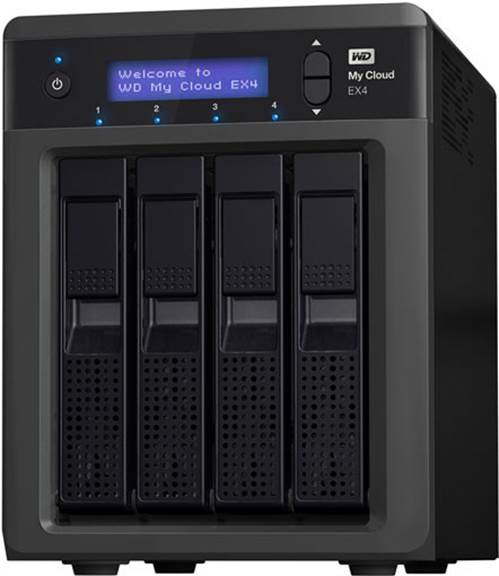Western digital’s My Cloud EX4 (go.pcworld.com/ex4) offers
all of the user-friendly features of the original My Cloud, packed in a metal
four-bay enclosure that boasts a number of high-end perks the My Cloud does not.
First and foremost is RAID support, specifically RAID 5 if you purchase the
device prepopulated with drives.

My Cloud EX4
The unit we tested came from the factory with four 2TB
drives in RAID 5, which means any one of the four drives could fail and you
would still be able to recover all your data. Because the drives are
hot-swappable, you can yank out the failed drive and replace it with a new one,
and the EX4 will automatically rebuild the array without any downtime.
The balance of the EX4's feature set will appeal to consumer
and business users alike. Consumers will appreciate its friendly, dashboard
like user interface, its DLNA server and iTunes support, and its built-in
torrent downloader. Business users will value its dual gigabit Ethernet ports,
with support for both link bonding (so you can pool the bandwidth of two
broadband connections) and automatic failover (if one connection fails, the EX4
automatically switches to the other). Dual power connections deliver similar
functionality: If one power supply fails, the EX4 can automatically switch to
the other (though you must purchase the second one).

Business users
will appreciate the dual gigabit Ethernet ports.
Both camps will like the EX4's onboard display and its dual
USB 3.0 ports. WD includes ten WD SmartWare Pro licenses for client-PC backups
in the purchase price, and the NAS supports Time Capsule for Mac backups. WD
also offers mobile apps for Android and iOS devices, along with many
third-party apps. But one feature that's sorely missing is the ability to sync
folders via the cloud.
The My Cloud EX4 delivers a great collection of features for
its price tag. You can buy a bare unit and supply your own drives, or you can
buy an EX4 that's prepopulated with WD's own Red drives.
In our benchmarks, the four-drive My Cloud EX4 read both our
10GB collection of files and folders and our single 10GB file somewhat faster
than the single-drive My Cloud, but it was significantly slower reading than
the much more expensive QNAP TS-469 Pro. The EX4 was significantly slower than
both devices when writing a single 10GB file, and it also fell behind the other
two boxes when writing our 10GB collection of files and folders.

If one power
supply fails, the EX4 can automatically switch to the other (though you must
purchase the second one).
We replaced the EX4's WD Red drives, which spin their
platters at 5400 rpm, with four 1TB, 7200-rpm Seagate Constellation drives to
see if the faster drives would improve the EX4's performance. It didn't matter:
The benchmark results were nearly the same.
If you're a consumer, you won't care about the EX4's
Ethernet and power-failover features. And if you're a small-business owner, you
won't care about the My Cloud EX4's DLNA server and iTunes support. Both
parties, on the other hand, just might decide that the EX4's low price tag and
strong feature set trump its slow performance.

The WD My Cloud
EX4 produced unimpressive performance and is particularly slow in writing.
Specification
|
Specs
·
Four-bay enclosure, 0 - 16 TB
·
Dual Gigabit Ethernet
·
Dual USB 3.0 expansion ports
·
2.0 GHz processor
·
512 MB of system memory
·
PC/Mac compatible
·
RAID 0, 1, 5, 10; JBOD, spanning
·
Easy drive install and hot swap
·
Twonky 7.2 DLNA 1.5 & UPnP certified media server
·
Anywhere access from computers, tablets, and smartphones with
My Cloud desktop and mobile apps
·
A full suite of third-party apps
·
iTunes support
·
Dual power and network redundancy
·
Optimized for WD Red drives with WD's exclusive NASware
technology
Pros
·
Strong feature set
·
Ten PC client backup licenses
·
Power and Ethernet failover
Cons
·
Very slow read/write performance
·
No provision for folder syncing
Bottom
line
·
The My Cloud EX4 has all the features you want in a four-bay
NAS and is priced right, provided that you accept its performance deficiencies.
Price: $800 (including four 2TB Red drives)
Overall: 3.5/5
|